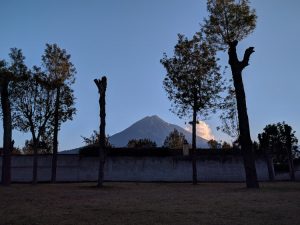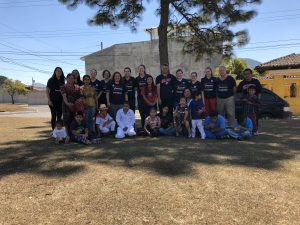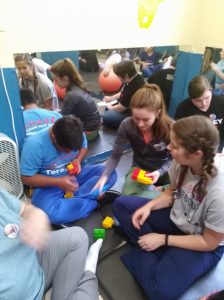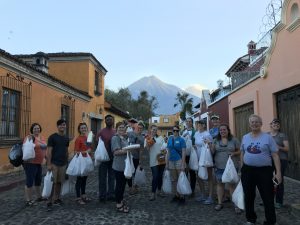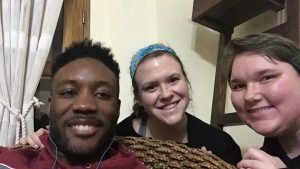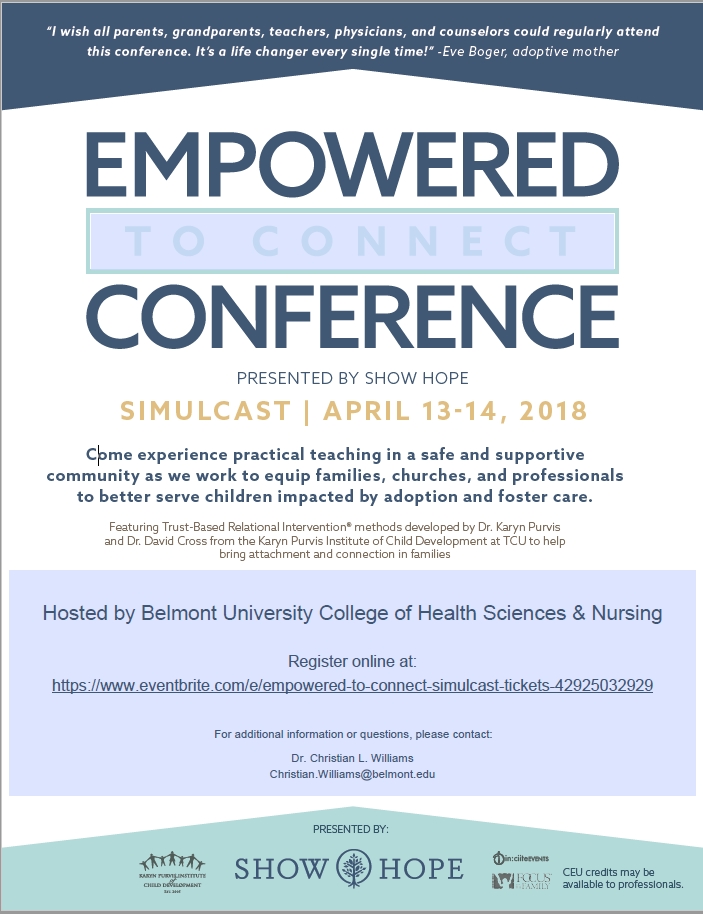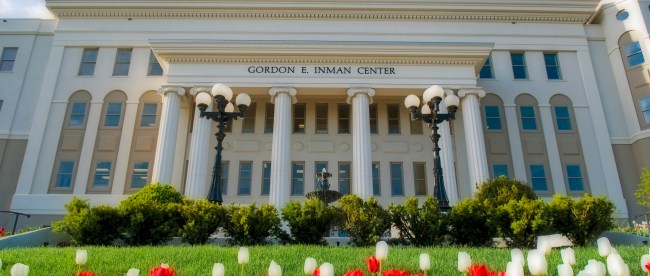In Fall 2017, an inter-professional team consisting of faculty from Pharmacy, Occupational Therapy, Nursing, Social work, Physical Therapy, Public Health and a staff member from University Ministries designed and delivered an event addressing how personal spirituality can influence interactions with patients. Student feedback from the event was positive overall, with suggestions to provide additional events addressing spirituality, add perspectives from other health professions and lengthen the event to allow for more questions and discussion. Faculty added that including an alumni panel might be of additional interest to students and placing students at tables rather than rows of seats might further facilitate group discussions. Continue reading
Category Archives: Public Health
Global Medical Brigade Student Group Spends Spring Break in Honduras

The newly established Belmont chapter of Global Medical Brigades spent spring break in rural Honduras working alongside the local community to help implement a sustainable healthcare system. The group participated in a 3-day temporary clinic in the remote community of Manzaragua where they worked intake/triage for almost 700 patients, shadowed and assisted healthcare providers, conducted “charla” (chats) with the local children teaching them proper dental care while administering fluoride treatments and collected electronic patient records to help monitor overall community health trends.
In addition to the clinic, they participated in public health projects where they worked on a pipeline for a clean water project in a community with no running water and built eco-stoves that help provide clean-air living conditions in the home. Students in BGMB represent a diverse group of majors from across campus including pre-health, biology, social work, chemistry and exercise science, among others. The chapter worked closely with the Public Health Program to prepare for their trip and Dr. Williams, director of the public health program, serves as their advisor.
Mission to Guatemala, Day 4.
Today was day four! We have made it to the middle of our trip… boy how things have truly fallen into place. Every day it feels as though we grow more familiar and aware of our surroundings, but I don’t know if we will ever get use to this view!!!! [The picture doesn’t do this scenery justice!]
Mission to Guatemala, Day 3.
It was a great day all the way around today!
Our morning routine continued like normal today, we gathered for breakfast and made our daily game play. Like yesterday, the students and professors of Occupational Therapy, Physical Therapy, and Social Work headed back to Keramion while the group of Nursing and Pharmacy students opened clinic in San Miguel. Each day brings new excitement and experience a valued part of this amazing trip thus far.
Continue reading
Mission to Guatemala, Day 2.
It was another beautiful day in Guatemala!
Today we embarked on our first day of clinic work, but not before sharing a morning meal together. With a quenched appetite, we were all energized for the day ahead. We separated into two groups headed for two different facilities, but kept one goal — to learn, to care, to teach, and to spread love to all those we are surrounded by.
Continue reading
Mission to Guatemala, Day 1.
Aside
Hola! ¡Buenas noches desde Antigua!
After a long Saturday traveling in two separate groups into Guatemala City, the team is finally together and we have made it to Antigua! We woke up to a beautiful view of the volcanos and the lively community of Guatemala City for breakfast before the hour ride into Antigua. Upon arrival we were graciously welcomed into our homes for the next week to unload our bags and take in another incredible view. After getting settled in, we headed into the Square for lunch and grocery shopping that doubled as our daily workout. When we returned with our groceries, a few of the students prepared a yummy taco dinner for the entire team. During the meal preparations the pharmacy students adventured back into the city to pick up medication supplies for the clinic days ahead. To conclude our day we joined as a team to have a relaxing prayer and discussion on our excitements and gratitude for the opportunities that lay ahead of us this week. As a team we are all immensely blessed to have a chance to travel here and carry out God’s work in Guatemala!
Stay tuned for more pictures and updates on our week!
With love,
Kaitlyn Kerley, Caleb Darensbourg, and Cassidi Honer — Pharmacy and Social Work students.
College of Health Sciences to host patient care conference simulcast
College of Health Sciences and Nursing Hosts Visiting Professor Dr. Amanda Phelan
 The College of Health Sciences and Nursing recently hosted Visiting Professor Dr. Amanda Phelan, associate professor and associate dean for global engagement for the School of Nursing, Midwifery & Health Systems at the University College Dublin (UCD). Phelan also serves as the co-director for the National Centre for the Protection of Older People at UCD.
The College of Health Sciences and Nursing recently hosted Visiting Professor Dr. Amanda Phelan, associate professor and associate dean for global engagement for the School of Nursing, Midwifery & Health Systems at the University College Dublin (UCD). Phelan also serves as the co-director for the National Centre for the Protection of Older People at UCD.
While on campus, Phelan presented on nursing education, health care and public health systems in the Republic of Ireland. She met with students and faculty interested in international collaboration and scholarship and discussed special challenges associated with the Republic’s aging population, as well as her own research in the area of elder abuse and protection.
Phelan provided an overview of Sláintecare, a newly proposed model of care for Irish citizens. Said to be a radical transformation from traditional models, Sláintecare is designed to shift care out of hospitals and into the primary care, community setting.
Phelan will be working with Belmont students participating in the upcoming Public Health and Public Health Nursing Maymester trip.
Tennessee Health Care Hall of Fame Opens Nominations for 2018 Class
With a mission to honor men and women who have made significant and lasting contributions to the health and health care industry, The Tennessee Health Care Hall of Fame seeks to recognize and honor the pioneers and current leaders who have formed Tennessee’s health and health care community and encourage future generations of health care professionals. Created by Belmont University and the McWhorter Society, The Hall of Fame is supported by the Nashville Health Care Council, a Hall of Fame Founding Partner.
This year’s nomination process opened after the 2017 class was inducted at a ceremony held on Belmont University’s campus in October. The nominations process will remain open until February 15 and can be accessed at www.tnhealthcarehall.com. The 2018 inductee class will be announced at the McWhorter Society’s May luncheon.
Nominees can be practitioners, executives, entrepreneurs, mentors, teachers, scientists, researchers, innovators or any person with a connection to the health or health care field. Potential inductees must have:
- Been born, lived or have worked in Tennessee
- Made a significant impact and lasting contribution to health care at the local, state, national or international level
- Exhibit the highest ethical and professional character
- Serve as an outstanding role model in their community
To date, the Hall of Fame’s three inductee classes have included health care leaders from across the state including Jack Bovender, Dr. Dorothy Lavinia Brown, Dr. Stanley Cohen, Dr. Colleen Conway-Welch, Dr. Thomas Frist, Jr., Dr. Thomas Frist, Sr., Dr. William H. Frist, Dr. Henry Foster, Dr. Ernest Goodpasture, Joel Gordon, Dr. Frank Groner, Dr. Harry Jacobson, Jack C. Massey, R. Clayton McWhorter, Dr. Stanford Moore, Dr. Donald Pinkel, Dr. David Satcher, Dr. Mildred Stahlman, Dr. Paul Stanton and Danny Thomas.
A Selection Committee, comprised of health and health care leaders from across the state, will evaluate nominees for The Hall of Fame.
Belmont’s Health Sciences Simulation Program Earns Full Accreditation
The University’s program is the first in the state to earn the designation
Belmont University’s Simulation Program recently received full accreditation in the Teaching/Education Area from the Society for Simulation in Healthcare (SSIH) and the Council for Accreditation of Healthcare Simulation Programs. The status was granted for a five year period and is valid through December 2022.
The University’s robust Simulation Program exists to improve patient safety and health outcomes by providing high quality, evidence-based, experiential education in a safe innovative environment. With many labs offering a variety of experiences, students in many programs throughout the College of Health Sciences and Nursing (CSHN) have the opportunity to participate in a simulation during their time on campus.
In its report, the SSHC noted many program strengths including:
- Strong integration of student support in paid positions
- Tremendous faculty support of the program
- Continued expansion of faculty and staff skills
- A recognition of simulation value from learners
- Significant support from upper administration regarding the Simulation Program and its merits
Additionally, the Simulation Program’s material recycling program was acknowledged as one of Belmont’s best practices, and a recommendation that other programs adopt the initiative was mentioned. This innovative program saves the University more than $40,000 per year.
Director of the Simulation Program and Assistant Professor Dr. Beth Hallmark said students in the College will have many meaningful opportunities to participate in simulation, beginning as soon as their first semester. “Simulation is a safe place to participate in patient care,” Hallmark said. “It enhances patient safety and improves patient outcomes by increasing confidence and improving clinical reasoning. We also are able to expose our student to interprofessional training.”
Belmont’s Simulation Program is the first in the state to receive accreditation.
Dean of the College of Health Sciences and Nursing Dr. Cathy Taylor said, “Reflecting years of dedicated work, this achievement is truly a shining achievement for nursing and health sciences at Belmont. I’m so proud of our Simulation team and excited for the benefits it will offer future students and faculty.”
Tennessee’s Deputy Commissioner for Population Health to Speak at Belmont
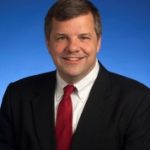 Dr. Michael Warren, Deputy Commissioner for Population Health with the Tennessee Department of Health, will speak at Belmont this Friday, October 27, at 10:00 a.m. during the convocation hour. His presentation will provide an introduction to public health/population health, discuss their importance, and take a look at public health in Tennessee. The event will be held in McWhorter Hall, Room 102. Students and the public are invited.
Dr. Michael Warren, Deputy Commissioner for Population Health with the Tennessee Department of Health, will speak at Belmont this Friday, October 27, at 10:00 a.m. during the convocation hour. His presentation will provide an introduction to public health/population health, discuss their importance, and take a look at public health in Tennessee. The event will be held in McWhorter Hall, Room 102. Students and the public are invited.
Tennessee Health Care Hall of Fame Inducts Six Health Care Legends at Luncheon and Ceremony
For images from this year’s event, click here.
The Tennessee Health Care Hall of Fame inducted six health care legends from across the state at a luncheon and ceremony held in Belmont University’s Curb Event Center today, Tuesday, October 17. Hosted by Senior Counsel at Finn Partners John Seigenthaler, the Hall of Fame’s Ceremony recognizes and honors the pioneers and current leaders who have formed Tennessee’s health and health care community and encourage future generations of health care professionals.
Created by Belmont University and Belmont’s McWhorter Society with the support of the Nashville Health Care Council, a Founding Partner, the Hall of Fame’s 2017 class includes:
- Dorothy Lavinia Brown: First African American female surgeon in the south, TN House of Representative and General Assembly Member, longtime educator and Chief of Surgery at Riverside Hospital and Clinical Professor of Surgery at Meharry, advocate for women’s health, rights and education
- William H. Frist: Former U.S. Senator and Majority Leader, Vanderbilt Transplant Center founder, first heart and lung transplant surgeon at Vanderbilt, Founder of Hope Through Healing Hands and NashvilleHealth, Senior Fellow at the Bipartisan Policy Center
- Joel C. Gordon: 47-year health care veteran who introduced physician ownership/joint ventures as a business structure, Founder of GeneralCare and Surgical Care Affiliates, Co-Founder of HealthWise of America, Owner of Gordon Group Investment Management
- Harry R. Jacobson: Physician, entrepreneur and investor who founded/co-founded eight companies, Past Chair of the Nashville Health Care Council Board of Directors, Executive-in-Residence at Belmont University’s Jack C. Massey College of Business, Past Vice Chancellor for Health Affairs at Vanderbilt University and former CEO of Vanderbilt University Medical Center
- Stanford Moore: Received the Nobel Prize for Chemistry in 1972 for his work with proteins and their composition which led to the first understanding of the complete chemical structure of protein and ultimately informed decades of scientific work surrounding disease and drug discovery; graduate of the University School of Nashville and Vanderbilt University
- Donald P. Pinkel: First Director and CEO of St. Jude Children’s Research Hospital; received the Lasker Award for Medical Research, Kettering Prize for Cancer Research and Pollin Prize for Pediatric Research; led the development of the first treatment for childhood acute lymphoblastic leukemia, increasing the cure rate from 4 to 50%
This year’s Hall of Fame inductees join an impressive list of health care legends honored in the last two years. These include Jack O. Bovender, Jr., Stanley Cohen, Dr. Henry W. Foster, Dr. Thomas Frist, Jr., Dr. Thomas Frist Sr., Dr. Ernest William Goodpasture, Frank S. Groner, Jack C. Massey, Clayton McWhorter, Dr. David Satcher, Dr. Mildred Stahlman, Dr. Paul Stanton, Danny Thomas and Dr. Colleen Conway Welch.
For more information on the Hall of Fame, click here.
CHS Dean Taylor Featured on HealthStream’s “Second Opinions” Podcast
 Dean of the College of Health Sciences and Nursing Dr. Cathy Taylor was recently featured on HealthStream’s “Second Opinions” Podcast. Taylor’s interview, “Rewiring Nurse Education to Match Industry Demands and Millennial Strengths,” details the ways in which nursing education programs are evolving based on the ever-changing health care workforce.
Dean of the College of Health Sciences and Nursing Dr. Cathy Taylor was recently featured on HealthStream’s “Second Opinions” Podcast. Taylor’s interview, “Rewiring Nurse Education to Match Industry Demands and Millennial Strengths,” details the ways in which nursing education programs are evolving based on the ever-changing health care workforce.
Taylor details training curricula and how it must change to match the needs of the “connected, digital millennial workforce.” She also explains the importance of setting realistic expectations regarding workforce rigor early in a student’s educational experience. Finally, she highlights the ways Belmont has adapted–namely through her team’s use of concept-based learning aimed at “producing flexible, curious, engaged graduates” who are prepared for their health care careers.
To listen to the interview, click here.
Top 5! Belmont University Lands Near Top of Annual U.S. News Rankings of Southern Colleges
University scores accolades for innovation, teaching, veteran support and more
For the ninth consecutive year, Belmont University has again achieved a Top 10 regional ranking with today’s release of U.S. News & World Report’s 2018 edition of America’s Best Colleges, this year ranking at an impressive No. 5 and remaining the highest ranked university in Tennessee in this category. Moreover, Belmont won the praise of its peers as it was included on a number of additional U.S. News lists that rate institutions on areas critical to student opportunities and success.
Belmont President Dr. Bob Fisher said, “These rankings provide benchmarks that are helpful to us as we work to provide programs that equip our students to go out and make a positive impact in the world. While it is rewarding to see Belmont reach a higher ranking overall, it is especially gratifying to be recognized by our peers for excelling in areas that promote strong outcomes for our students. As a student-centered university, this is at the heart of what we aim to achieve.”
In the publication released today, Belmont is lauded for the tenth year in a row for its commitment to “making the most innovative improvements in terms of curriculum, faculty, students, campus life, technology or facilities,” landing second on the “Most Innovative Schools” in the South list. Belmont earned acclaim in the following categories as well:
-
- Strong Commitment to Undergraduate Teaching (No. 4 in the South): The strong commitment to undergraduate teaching ranking is determined via a survey of peer institutions, who cite their fellow institutions who best reflect that quality.
- Best Colleges for Veterans (No. 3 in the South): To be included, institutions must be ranked in the top half of their overall category, be certified for the GI Bill and participate in the Yellow Ribbon Program with 20 or more veterans/active service members enrolled.
- Best Value (one of only 64 institutions recognized in the South): The listing takes into account a school’s academic quality and net cost of attendance for a student who received the average level of need-based financial aid. The higher the quality of the program and the lower the cost, the better the deal.
- Internships (one of only 20 institutions recognized in the nation): Schools in this category encourage students to apply what they’re learning in the classroom to work in the real world through closely supervised internships or practicums.
- Learning Communities (one of only 18 institutions recognized in the nation): In these communities, students typically take two or more linked courses as a group and get to know one another and their professors well.
- Service-Learning (one of only 23 institutions recognized in the nation): Required volunteer work in the community is an instructional strategy in these programs—what’s learned in the field bolsters what happens in class and vice versa.
- Study Abroad (one of only 44 institutions recognized in the nation): Programs must involve substantial academic work abroad and considerable interaction with local culture
Belmont Provost Dr. Thomas Burns said, “This has been an extraordinary fall for Belmont. We started the fall semester Belmont by announcing a record-breaking enrollment number for the 17th consecutive year – reaching a total of 8,080 students on campus. These students remind us every day that they are drawn to Belmont by the diversity and academic strength of our programs as well as by the intentional commitment to student success, as highlighted in the U.S. News rankings. I’m particularly proud of this incoming undergraduate class which brings, on average, the highest entering scores on the ACT (average 26.4) in the past four years. As an institution, we are committed to continue to do our best to fulfill the Belmont mission of providing an academically challenging education that will enable our students to engage and transform the world with disciplined intelligence, compassion, courage and faith.”
The U.S. News analysis places Belmont in a premier position among the 135 public and private institutions included in the South region, an area that covers Tennessee, Virginia, West Virginia, North Carolina, South Carolina, Georgia, Alabama, Florida, Kentucky, Arkansas, Mississippi and Louisiana.
Dr. Christian Williams Named Director of Belmont University’s New Public Health Program
 Belmont University recently named Christian L. Williams, DrPH, MPH as Assistant Professor and Director of its new Bachelors of Science in Public Health, a program recently created that seeks to address the critical topic of community well-being. Prior to coming to Belmont, Dr. Williams served as the Public Health Competency Coordinator for the Tennessee Department of Health where she was responsible for workforce development and training, served as the program director for the Commissioner’s Fellowship in Public Health and coordinated all student internships.
Belmont University recently named Christian L. Williams, DrPH, MPH as Assistant Professor and Director of its new Bachelors of Science in Public Health, a program recently created that seeks to address the critical topic of community well-being. Prior to coming to Belmont, Dr. Williams served as the Public Health Competency Coordinator for the Tennessee Department of Health where she was responsible for workforce development and training, served as the program director for the Commissioner’s Fellowship in Public Health and coordinated all student internships.
In her new role, Dr. Williams will oversee Belmont’s new public health program, educating the University’s first cohort of public health majors. A dynamic field of study and practice credited with saving millions of lives, public health focuses on improving the health of communities and populations by working to develop the conditions and behaviors that contribute to better health for all.
Williams said she has always been interested in the partnership between academia and public health practice, so the opportunity to lead Belmont’s new program was an exciting one. “This role allows me to prepare the future public health workforce and still engage public health practice through research, collaborative projects and opportunities for students.”
Dean of the College of Health Sciences and Nursing Dr. Cathy Taylor said, “We’re fortunate to have Dr. Williams join us in this leadership role with such an exciting new program. The BSPH is a perfect choice for students with a broad interest in population health, health policy or other health-related fields. Graduates will be able to enter the workforce directly or choose to pursue graduate study in a variety of disciplines, and we’re delighted to welcome our first cohort of students this fall.”
Dr. Williams received her DrPH in community and behavioral health from the College of Public Health at East Tennessee State University in Johnson City, Tennessee. Her research interests include workforce development, quality improvement, linkages between academia and practice and public health systems and services.
Belmont Adds ACE Resource Guide
As part of a grant recently provided by Tennessee and administered through the Department of Children’s Services Building Strong Brains Initiative, Belmont’s College of Health Sciences and Nursing has developed a resource library to promote the understanding of adverse childhood experiences (ACEs) for health care professionals. The library is part of Belmont’s Educating Trauma Information Professionals project.
Principal investigators Dean of the College of Health Sciences and Nursing Dr. Cathy Taylor and Associate Professor of Social Work Dr. Sabrina Sullenberger collaborated with Bunch Library faculty to develop the ACE Resource Guide. The guide provides access to the valuable library of materials collected to support professions that work alongside children and families during sensitive periods of development and beyond. The ACE Resource Guide is available to all Belmont students and faculty and can be accessed here.
Belmont Wins Inaugural Siloam Health’s Bridge Builder Award
Award given to recognize community partner committed to assisting Nashville’s New Americans
In honor of the University’s commitment to helping New Americans throughout the Nashville community, Belmont was recently honored with Siloam Health’s inaugural Bridge Builders Award. Belmont President Dr. Bob Fisher accepted the award at Siloam’s Amplify Nashville Awards Ceremony held on June 22 at Oz Arts. Belmont’s award by presented by Milton Johnson, CEO of HCA and Belmont trustee.
Siloam hosted the event to celebrate the immigrants and refugees who contribute to Nashville’s status as a growing, great city. The event celebrated four honorees for their tireless commitment to Nashville’s cultural diversity including:
- Community Catalyst Award: Kasar Abdulla (Valor Collegiate Academies)
- Good Neighbor Award: Fabian Bedne (Hispanic Family Foundation and Metro Council)
- Culture Shaper Award: Cano and Esen Ozgener (OZ Arts Nashville)
- Bridge Builder Award: Belmont University and Dr. Bob Fisher
Under Fisher’s leadership, Belmont consistently strives to align its vision with the ever-changing needs of its community and works to help New Americans get ahead with their education and in life. The University makes intentional efforts to hire documented, sponsored refugees, encouraging them to take advantage of the University’s educational offerings and covering the cost of ESL courses. Additionally, Belmont considers students living in the United States for admission without regard to immigration standing and offers support to assist foreign-born students with enrollment and the transition to college life.
Additionally, Belmont’s Colleges of Pharmacy and Health Sciences and Nursing have been in partnership with Siloam for many years. Dr. Elissa Greene, assistant professor of pharmacy, practices at Siloam when she isn’t teaching at Belmont and hosts student pharmacists daily for clinical rotations. Students serve as resources for medical personnel, make recommendations on medication, provide patient and family counseling and make home visits, among other things. Nursing students also visit Siloam for clinical experiences, faculty members serve as regular volunteers and the College will be partnering with the organization’s faith-based, community health outreach program in the future.
John and Nancy Le, pictured above with Dr. and Mrs. Fisher, were also present at the ceremony. The Les, both retired Belmont employees, came to Nashville from Vietnam 25 years ago under Catholic Charities. They both worked at the University for more than 20 years, and four of their children and grandchildren have attended Belmont. Their story was shared at the event as an example of Belmont’s commitment to Nashville’s new Americans.
“It is so important for Belmont to serve the Nashville community,” Fisher said. “We are honored to call Nashville home, and it’s our privilege to serve our city’s newest residents through educational opportunities, employment and more. Siloam Health continues to do incredible work throughout our city, and we are so grateful to have been recognized with this award.”
Mission to Cambodia: Empowering Pharmacists at Hope Hospital
by Jade Readus Williams, Pharmacy Team
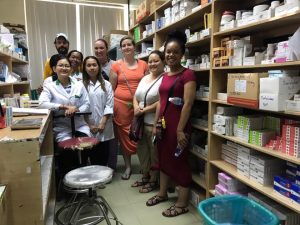
Illiteracy, especially health illiteracy, is a significant problem for many of the people in Cambodia. A few days ago, the Pharmacy team got the opportunity to teach the pharmacists at Hope Hospital how to communicate with patients with low health illiteracy. Throughout the presentation, we discussed how to use pictograms, body language, and verbal communication to educate patients about their medications. Afterwards, we asked the pharmacists to give examples of how they would explain certain medications to illiterate patients. The Hope Hospital pharmacists were eager to present their examples. It was inspiring to see the pharmacists apply what we had taught them. It emphasized the fact that we can really make a change through teaching and empowering the people of Cambodia. I am so grateful to be a part of the awesome work that is happening here.
Mission to Cambodia: What I’ve Learned
by: Candida Damian
As our trip in Cambodia is coming to the final week, I have been looking back to everything that I have learned on this trip. Wow. What an amazing time I have had abroad in Cambodia. The experiences I have had here are unforgettable, and I can’t wait to bring stories back home to my family and friends.
Today, I had the opportunity of shadowing in the emergency department at CMH in Phnom Penh. The staff and nursing students were so open and nice to me while I was there. It is such an amazing privilege to be able to do what I love in another country. It makes me extremely proud to be a nurse in the near future. Nursing is needed everywhere in the world, and it is reassuring when nurses do things here similar to how we do things in the States. Nursing is so universal and it is vital in every place in the world.
Emergency departments have always interested me, so I was excited when I was able to shadow in the ED. It is very busy, but it can also be calm. The staff took great care of each and every patient, and it was nice to see when a patient could get up from the bed and walk away from the ED feeling better. I enjoyed comparing and contrasting the ED here in Phnom Penh to ED’s in the U.S. Even though certain things are different, at the end, they still both perform the same exact tasks. A nurse asked me if I wanted to perform an EKG on a patient. When I went up to the EKG machine, I noticed that it looked different from the EKG machines used in the States. The nurse then taught me how to use this machine. It is cool to see that even though they looked completely different exteriorly, it functioned the same way.
At the end of the day, we went to one of my favorite places for dinner. It is called ‘Friends’, and we all got tapas. The reason why I love this place so much is because we all share our food. I love sharing and I love food, so putting it together is great. The food is so good, and I left with a satisfied belly. Some of us ended the night with a massage. I really enjoy getting massages here because it is cheap, and the masseuse was extremely nice. In all, today was great and I’m looking forward to our final days here in this beautiful country.
Mission to Cambodia: Our Last Clinic






Mission to Cambodia: First Day Back in Phnom Penh!
Today was a much needed recuperation day for us undergrads! We’re all so thankful to be back in Phnom Penh, because it’s really started to feel like home.
We began the morning with our familiar breakfast here at the Golden Gate Hotel (lots of mangoes for me!) and then had our daily devotional. We then broke into our individual pairs and prepped some for our teaching day later this week. We have the opportunity to teach some students at the hospitals, so we whipped our power points into shape and went over what we would say and do with our students. We had some free time this afternoon (a rare and beautiful thing) so a couple of us went to a local coffee shop to catch up on neglected school work. The shop we went to felt very much like home: modern, air-conditioned, and with good wifi. It’s cool to think about those shared experiences we have with the students here of going to trendy coffee shops to desperately try to study or write an assignment. It was also a huge relief to feel like I’m caught up with school and not let it distract me from all the amazing things we’re doing here.
For lunch we ate at one of our favorite restaurants! It’s a favorite mostly because they serve amazing western food, including milkshakes. I know I left happy, and it looked like the rest of the table was pleased with their meals too. It’s hard to dine with so many people sometimes because Cambodians just bring out the food whenever it’s done, so by the time the last person gets their food half the table is usually finished. This bothered me a little when we first arrived because it felt rude to not wait for everyone but I think we’ve all learned that if we waited everything would get cold. It’s a small difference between here and the US, but it’s really noticeable with a group of 20 dining at a small establishment.
The afternoon was free for us as well, so a group of us went to the central market! We’ve been to several markets before but I think this one was by far the largest. It was open air, though, and partially indoors in a spacious building, so it didn’t feel as suffocating as the Russian market feels. I proudly walked out without spending a penny, but several of us left with multiple sey, a small toy that you use to play a game similar to hacky sack. It’s our favorite game to play down in the lobby during the evenings, so I expect quite a few of you family members and friends will be introduced to it when we all get home. After the market, a large group decided to make their way back to a coffee shop to work. I, feeling that I had accomplished enough that morning, made the executive decision to take a nap instead. It was very much needed after our long days of travel and temples and clinics.
Dinner was another lovely meal at our most frequent stop, Anise. They have such a good variety, so everyone leaves with something they liked. I know a few of us were feeling a little ill, but the group stayed positive and we had a great dinner regardless. There was plenty of lime soda all around!
To top off a very good day, a few of us played sey before heading off for a massage. This was my first massage experience here in Cambodia, and while it was fun I don’t think I’ll be joining the ranks of the massage enthusiasts. I am far too ticklish to have a stranger touch my feet, but I’m glad I finally experienced what all the hype was about! It was a peaceful way to wind down and de-stress a little on an absolute whirlwind of a trip.
Mission to Cambodia: Third Clinic in Poipet and Traveling to Siem Reap
My roommate and I woke up this morning convinced that the world was ending. Music and yelling from the streets outside our hotel was so loud that we could feel the entire building shaking. Turns out it was just a parade because of the upcoming election that was casually going on at 6:20 AM. Cambodians are early risers, that’s for sure. Once we were assured that the world would in fact go on, we got up and got ready for the day. After a breakfast of noodle soup and iced coffee with sweet milk, we were off to our third clinic around Poipet.
On the bus in the morning, Dr. Massie led a devotional and prayer. She spoke about how we are all broken in our own ways, but that God uses our brokenness and our differences for the good of his Kingdom if we come to Him as we are and allow Him to work through us. If you are interested in the story that she shared with us this morning, google “Indian cracked pot story”. Unfortunately, the parades for the election caused a lot of traffic buildup and we were a bit late showing up to the Vision of Hope Center, a small Christian school that opened its doors for us to set up our clinic. Our lovely translators and other friends from Freedom’s Promise met us there. The building was small but we made it work as usual. Today was a short day due to both showing up later than planned and also because we had a three-hour bus ride from Poipet to Siem Reap, where we will be staying until Sunday morning. Despite only lasting a little over three hours, we were able to see a good number of patients. The nursing students switched roles a little bit so that we were all able to have multiple experiences over the three days. Kim and Paige soldiered on assessing and diagnosing, and the pharmacy team did an amazing job working together and working with what they had to provide the best care that we could for these people.
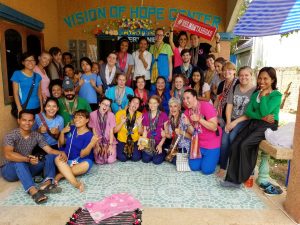
Last clinic in Poipet with all of the wonderful missionaries and translators who partnered with us to make these clinics possible!
I had the opportunity to be at the education and prayer station, which was the last table that the patients would go to before leaving. This was a difficult but really great experience for me both as a nursing students and as a Christian. A huge part of nursing is patient education, but I have not had many opportunities in nursing school so far to put that into practice. I found myself drawing from things I have learned in nursing school so far and being so thankful to Belmont and the wonderful education that I am so blessed to receive there. I spoke to patients about things like how and why to take the medications that they were given, different diet and lifestyle changes for things like diabetes or hypertension, living with asthma, relaxation techniques for anxiety, proper hydration and nutrition, and more. My heart went out to each individual that I spoke with, especially when it was clear that they were in need of the kind of medical care or
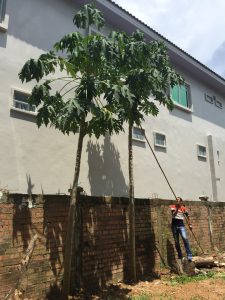
Getting fruit off the trees outside the school
education that we simply could not provide them with. After asking if they had any more questions, I would ask if it was okay if I prayed for them. Almost all of them said yes, and this was a special time to call on the Lord and ask for healing and safety for these people who we have grown to love so dearly in our short time here. Many of the people who I prayed over today were most likely Buddhists, but I was amazed at their reverence while praying and the kindness that they showed to me during our brief but hopefully meaningful interactions.
Around 1 PM, we packed everything up and ate a lunch of peanut butter sandwiches and some delicious fresh mango from right off the trees outside the school. The translators and everyone from Freedom’s Promise showed us so much love and kindness during our three days here, and they gave each of us a gift of a beautiful Cambodian scarf. After a prayer, lots of photos and hugs goodbye, our group of 20 piled into our bus and headed to SIem Reap.
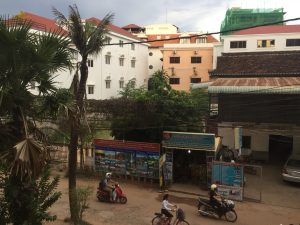
Views from our hotel in Siem Reap
The bus ride was about three hours long and the other undergraduate nursing students and I we passed the time telling gross and funny stories from our experiences in nursing school. We were stuck in traffic once again in Siem Reap because of the election. Once we arrived to the hotel we were greeted with cool towels and tea. We ate dinner at a rooftop restaurant on the top floor of our hotel. The hotel here in Siem Reap is very nice and we are all so excited to have a break from working hard in the clinics and for the opportunity to tour the temples around Siem Reap tomorrow! Everyone is going to bed early because tomorrow we leave at 4 AM to catch the sunrise at Angkor Wat!

Mission to Cambodia: Second Poipet Clinic Day
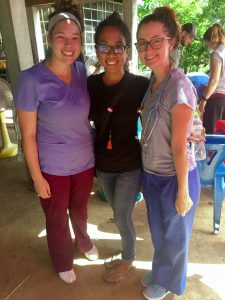
One of our translators Sarah!
Today, we held our second day of clinics in Poipet. We started off the day with leftover, cold pizza for breakfast because we needed a pick me up from yesterday’s breakfast. Our group had ventured out and we were served Khmer porridge with chicken liver and some were adventurous than others. A woman from the community opened up her home so we could use it as the clinic. It was a smaller space with an open patio and curtains to block out the sun (we greatly appericiated this). It was amazing this woman who didn’t know us would offer up her home so we could run the clinic in her village. We didn’t know where we were going to set up clinic, but we trusted God would provide and He did. We saw around 70 people that day of varying ages. We saw several babies and children and it was sad to see what they were going through, especially the malnourished children and scabies wounds.
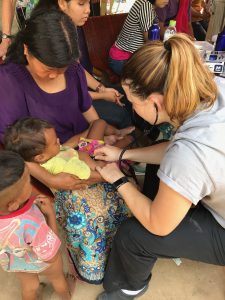
One of our practitioners, Kim, assessing this sweet baby!
This is such a huge problem in all third world countries, but it never gets easier to see children suffering from it. The children are still so joyful and want you to play with them despite them not feeling their best, which is very inspiring. Our translators from Freedom’s Promise were outstanding. There was no way we could do our job without them! We all worked with the same translator for the 3 days of clinics so we got to know them really well and enjoyed spending time with them.
From the outside looking into the clinic, it looked like mass, unorganized, chaos, but on the inside everyone had a place and job. We had nurse practitioners, undergrad nursing, and pharmacy all working together to make the clinic run smoothly. We functioned extremely
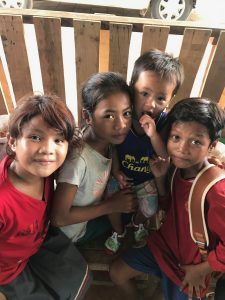
Some of the sweet children we were able to take care of
well together, especially since it was our second day understanding how the flow of the clinic should be. The most incredible part of the day was watching our entire team work together and really see all of the nursing & pharmacy skills we have learned put into practice. It was like it finally clicked with us how much we truly knew and have learned. This was a neat experience because we all had different moments when we realized this. Several of us shared stories that night during our highs and lows about those moments. Highs and lows are something we do (attempt) every night where we can share moments or stories from the day with the whole group. Even though we were together all day, we all had different experiences and enjoy hearing our different views. IMG_7055.MOV (click on link to see video)
 Later tonight, we went to dinner and then came back for praise and worship with Freedom’s Promise. We sang and worshiped together and it was truly amazing to see just how powerful God’s love is. His love is not just in our Bible belt of the South, but across the entire world. It is very powerful to watch Him work in everyone’s lives and see how much impact God has had in Cambodia and in our lives the short time we’ve been in Cambodia. After we worshiped, Freedom’s Promise brought out handmade bags, wallets, and other little items for purchasing. Our group swarmed at them because apparently we can’t pass up a good Cambodian deal. Dr. Massie was the first one there and just about everyone in our group bought something! We had a great day and tomorrow we are doing another clinic in Poipet before we head to Siem Rep for temples and being tourists!
Later tonight, we went to dinner and then came back for praise and worship with Freedom’s Promise. We sang and worshiped together and it was truly amazing to see just how powerful God’s love is. His love is not just in our Bible belt of the South, but across the entire world. It is very powerful to watch Him work in everyone’s lives and see how much impact God has had in Cambodia and in our lives the short time we’ve been in Cambodia. After we worshiped, Freedom’s Promise brought out handmade bags, wallets, and other little items for purchasing. Our group swarmed at them because apparently we can’t pass up a good Cambodian deal. Dr. Massie was the first one there and just about everyone in our group bought something! We had a great day and tomorrow we are doing another clinic in Poipet before we head to Siem Rep for temples and being tourists!
Mission to Cambodia: On the way to Poipet we go!
After nine hours of riding in a bus that reminded me of the Taj Mahal (purple curtains included), our entire team has finally arrived in Poipet, Cambodia. The bus ride started out a little rough. Unfortunately, the fire extinguisher fell from one of the overhead shelves and exploded as soon as it hit the ground. The white fumes started spreading everywhere, so we quickly pulled over to air the bus out. After that little hiccup, we were smooth sailing. And by that I mean the bus ride felt much like a wooden roller coaster at an amusement park.
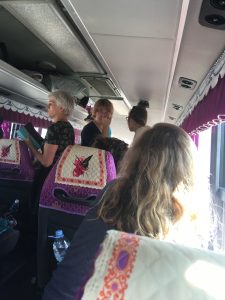
When the fire extinguisher broke – note the purple curtains and seat covers.
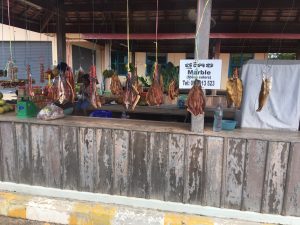
Meat market at one of our stops


After arriving in Poipet, we checked in to our hotel and headed straight to dinner. We were all starving and in desperate need of some nourishment. One of our hosts took us to a casino on the Thailand border and we ate at the restaurant inside. For the past week, I’ve been on a hunt to find something green to eat (coming from the girl who eats spinach out of the bag like chips). Lucky for me, the restaurant had broccoli! I was on cloud nine to put something green and tasty in my mouth.
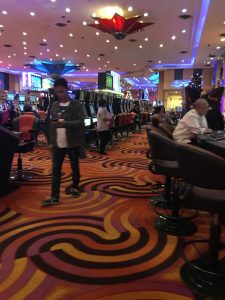
Casino on the Thailand border
On the way back to the hotel, our host and a few of the translators that will be working with us at the clinics tomorrow told us about Poipet. We drove by a street that had building after building of massage businesses with young girls sitting out front. I thought to myself how strange it was to have so many places to get a massage all lined up together and how it seemed awfully late to be going to get a massage. A second later, our host turned to me and said that the girls sitting outside were probably somewhere around my age. He added that the store fronts say that they offer massages, but their real business of prostitution is in the back of the building.
At first, I didn’t really comprehend what he was telling me. How could these young, pretty girls be caught up in such a horrible cycle like human trafficking and how did they get into this situation in the first place? It hurt my heart knowing that these girls were around the same age as me and didn’t have an escape route from their present reality. As I thought more and more about it, I started to realize a few different things. Human trafficking effects all countries and it does not discriminate against race, ethnicity, or socioeconomic status. There are many factors that perpetuate the cycle and a few that are especially unique to Cambodia. The country continues to rebuild itself after the mass genocide that occurred in the 70’s under the Pol Pot regime. With high levels of poverty, few job opportunities, and a broke justice system, trafficking and exploitation in this vulnerable country continues to persist.
Over the next couple of days, our team will be working with an organization called Freedoms Promise as we set up clinics and see patients in different provinces around Poipet. Their mission is to free those who are caught in the cycle of human trafficking by restoring communities, empowering leaders, and sharing their vision of freedom from oppression through the love of Jesus Christ. Please continue to pray for our team as we treat and educate patients over the next couple of days and love on the people of Poipet.
Mission to Cambodia: Hope Hospital and Preparing for Poipet
By Tessa Collier, Undergraduate Nursing Student
Today, the undergraduate nursing students went back to Hope Hospital here in Phnom Penh while the graduate nursing students went on home visits in the area. This morning eleven students and our three professors piled into the hospital van with several huge, military green duffel bags full of supplies to donate to the hospital. Dr. Massie led a Memorial Day themed devotion en route. When we arrived, we walked into the lobby to take a group photo with all of our donations. I have noticed that so many people want to take photos with us, and I have not encountered that on previous study abroad and mission trips I have been on.
Our group of eight students split into two, and we were led on a tour of the hospital. We were informed that Hope is known throughout the country for providing excellent care, and Cambodian nursing students love having the opportunity to learn at the hospital. Our guide explained to us how the hospital used to take pride in providing completely free healthcare to its recipients but decreased funding has forced it to start charging (albeit minimally) for services. We were led through the different departments, such as the Emergency Room, a minor procedure room, and Radiology. These are among the few of the only air-conditioned rooms in the entire facility. Instead of indoor waiting rooms, patients wait outside because the sun kills Tuberculosis. We walked through the beautiful courtyard with a large mango tree into a clinic and the lab. We finished our tour by visiting the medical and surgical wards on the second floor. Each ward has about 12-13 beds; there are no individual patient rooms. If a patient needs privacy while a procedure is performed, curtains are pulled around his/her bed. There are no patient care techs or nurses aides. Family members help move the patient from stretcher to bed and are taught by the nurses how to help in managing the care of the loved one. Coming to this hospital also makes me realize how much we waste in America’s hospitals. They do not dispose of chest tubes or other small things that we usually take for granted.
We dropped off five students to shadow local doctors and nurses. Two other students and I followed Dr. Massie, Dr. Taplin, and Dr. Wofford to the medical and surgical wards to look at charts. Charts here are still done through card copies. Dr. Taplin told us that every hospital in the country is required to chart in either English or French (two of Cambodia’s official languages, after Khmer); this particular hospital uses English because it was founded by English speakers. In the medical ward, Dr. Taplin opened the chart of a patient with abscesses in his spleen. They had found growths of what are called Burkholder’s pseudonomas (a term that was not even in Stedman’s Medical Dictionary) which is a type of bacteria common to this region. We then looked at the chart of another patient with Cirrhosis who had come to the hospital with ascites, which is fluid that has shifted into the abdomen. The doctors had just finished performing a paracentesis, draining 1.5-2 liters of fluid from the man (this is the maximum amount that can be drained per day.
We then went to the surgical ward where Dr. Taplin went over the chart of a woman who underwent a mastectomy to remove a huge tumor that had been growing for three years. She had not had access nor the education to wellness check-ups or cancer prevention that we have in the States. At this point, the woman was put on palliative (comfort) care because there is nothing more that can be done for her. There is no chemotherapy in this country. People who have the money can go over to nearby countries, such as Singapore, for treatment, but for the poor there is no such luxury. Dr. Taplin, Dr. Massie, and Dr. Wofford led the three of us students in a discussion about how care differs in this country compared to the States. Again, this hospital is known for providing quality care. So while there are many differences between the two systems, just because they do things differently here does not necessarily mean that it fails to provide great care to patients. It was a very informative and thought-provoking discussion.
We later regrouped with the other five students and went to lunch at Flavours Restaurant, where we went for dinner our first night here. We are now preparing for our nine-hour drive to a province called Poipet tomorrow where we will set up clinics.


